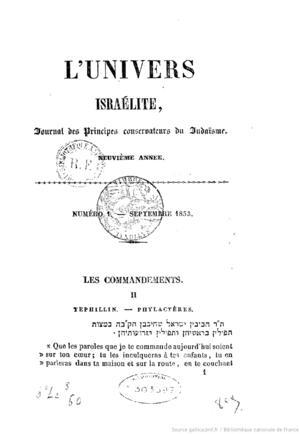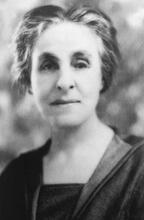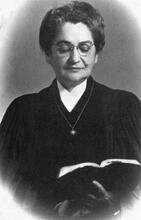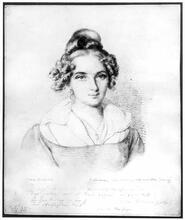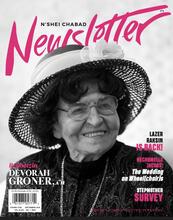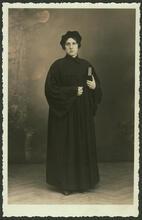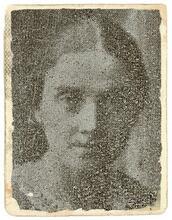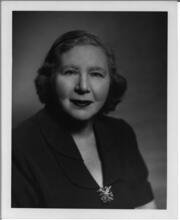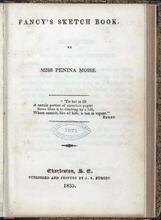Julienne Bloch
Julienne Bloch devoted her life to strengthening the commitment of French Jews both to Judaism as a religion and to their fellow Jews at home and abroad. As a journalist and an educator, she fought against the increasingly widespread assimilation, acculturation, and secularization of the period following the emancipation of French Jews, and her writings paint a vivid picture of the tensions within the mid-nineteenth-century Franco-Jewish community. As one of the earliest published Jewish women writers in France she also contributed to the creation of a public sphere for French Jewish women. During her short life, Bloch posed important questions about the role of women in Judaism and the role of Jews in France and offered innovative solutions.
Julienne Bloch devoted her life to strengthening the commitment of French Jews both to Judaism as a religion and to their fellow Jews at home and abroad. As a journalist and an educator, she fought against the increasingly widespread assimilation, acculturation, and secularization of the period following the emancipation of French Jews, and her writings paint a vivid picture of the tensions within the mid-nineteenth-century Franco-Jewish community. As one of the earliest published Jewish women writers in France she also contributed significantly to the creation of a public sphere for French Jewish women.
Early Life and Education
Bloch was born on August 11, 1833, in Mutzig (Alsace), the daughter of Simon Bloch (1810–1879) and his wife (name unknown). She received a fine religious and secular education, as evidenced by her excellent performance in the teacher certification examinations she took in the early 1850s and by the erudition of her writings, in which she drew regularly on French, German, and English sources. From 1854 to 1861 she contributed articles to the Univers Israélite de France (one of the major Jewish newspapers in France, founded and edited by her father) under the rubric “Lettres d’une Parisienne.”
As was common among nineteenth-century women writers, Bloch often began her articles on a note of false modesty, apologizing for making herself heard as a woman. However, she then proceeded to comment astutely on a wide range of contemporary political, religious, and social concerns as they affected Jews in France and elsewhere. Within a single letter she often treated several subjects and made use of a variety of tones, ranging from the pedagogical to the lyrical and to the satirical.
Writing Themes: Critiques of French Jewry
Bloch’s articles provide a complex analysis of France and the French milieu. Like most of her co-religionists, she was profoundly grateful to France for its early emancipation of the Jews during the French Revolution. She regularly expressed her appreciation of the French nation for creating a society in which Jews could flourish, and she took pains to emphasize the consonance of Jewish and French Revolutionary values. At the same time, she often warned of the threat to Jewish continuity posed by the assimilatory pressures and temptations of French culture. She was also extremely vigilant for signs of anti-Jewish prejudice, which she recognized had not entirely disappeared, even in her beloved country. In an exchange of letters with the writer Eugène de Mirecourt, for example, she upbraided him for his pejorative descriptions of well-known Jews and for the derogatory connotations he gave to the word “Jew.”
Bloch’s treatment of her fellow French Jews displayed a similar ambivalence. She often praised their industry, intelligence, creativity, and philanthropy, and occasionally their devotion to their religion. Yet she was deeply troubled by the religious and moral condition of French Jewry; indeed, the purpose of all her writings was to fortify the community through a combination of criticism, exhortation, and instruction. In many columns, she criticized her co-religionists for abandoning traditional religious practices, straying from the close-knit Jewish community of earlier days, and forsaking Jewish values of respect and charity for materialistic and social gains. She also urged them to pay careful attention to events in France and abroad that affected the Jewish people, such as instances of anti-Jewish attitudes or the plight of Jewish prisoners from the Crimean War. French Jews, she believed, had a duty to work diligently on behalf of their less fortunate co-religionists in other countries. Bloch also used her articles—especially those written on the occasion of Jewish holidays—to instruct her readers in Jewish history and Jewish values.
Writing Themes: The Role of Women in Judaism
Bloch devoted a great deal of attention in her writings to the subject of women’s place in Judaism and their responsibilities to the Jewish community. Overall, she believed that Judaism’s treatment of women was admirable. She often referred to Judaism’s emancipatory effect on women, writing, for example, “Lovingly I salute you, holy religion of Israel, who has truly emancipated women and assured them such a glorious place in the history of our people and in the sanctuary of our families” (March 1857). At the same time, she did not hesitate to criticize aspects of the Jewish tradition that she considered unjust toward women, such as the prayer traditionally recited by man thanking God for not having made him a woman, and the prohibition against the mixing of male and female voices in the synagogue.
With men abandoning their traditional religious pursuits in favor of activity in the secular world, Jewish women in nineteenth-century France were increasingly identified as the mainstays of cultural and religious continuity, and Bloch’s columns both reflected and propagated these trends. Believing that women were central to efforts to strengthen the Jewish community, she regularly criticized aspects of Jewish women’s behavior that she found shallow or contrary to Jewish values, and she urged women to become more knowledgeable about their religion, for their own sake and to enable them to bring up their children as devoted Jews. In discussing Jewish history or holidays, she often focused on female figures, conveying to her readers her belief that women had always played important roles in Jewish life.
Innovation in Girls’ Education
Bloch’s focus on women as “the future and the hope of Israel” found expression not only in her writings but also in her work as an educator. After qualifying as a teacher at the age of sixteen and obtaining a higher-level diploma three years later, she opened a series of private schools for Jewish girls, first in Lyon and later in Paris. Unlike many contemporary educational establishments for Jewish girls, Bloch’s schools emphasized a high level of religious observance and instruction. Her pupils recited the afternoon service of Minhah every day, attended synagogue every Friday evening and Saturday morning, and celebrated all the Jewish holidays. They also studied Hebrew reading, translations of prayers, and religious history. Through this work, Bloch hoped to help shape a generation of Jewish girls who would remain committed to their religion and their community.
Bloch died of tuberculosis on November 12, 1868, at the age of 35. She had spent much of her short life promoting the welfare of the French Jewish community. In speaking out courageously on a variety of issues, she helped to expand norms of acceptable behavior for Jewish women.
Selected Works
“Lettres d'une Parisienne.” L’Univers Israélite de France 9 (1853–1854): 481–486; 10 (1854–1855): 26–29 124–129, 193–197, 270–273, 374–377, 523–527; 11 (1855–1856): 37–41, 137–141, 231–234, 322–327, 519–523; 12 (1856–1857): 84–89, 289–296, 433–438; 13 (1857–1858): 1–7, 289–294; 14 (1858–1859): 40–46, 339–344, 15 (1859): 47–53, 349–356; 17 (1861–1862): 37–42.
Bitton, Michèle. Présences féminines juives en France, XIXe-XXe siècles. [Pertuis]: 2M Editions: 2002, 190–192.
Bloch, Maurice. “Une journaliste juive.” L’Univers Israélite de France 51 (1895–1896): 32–34.
Schwab, Moïse. “Bloch, Julienne.” The Jewish Encyclopedia. New York: Funk & Wangalls Co., 1906, 254–255.
“Julienne Bloch, in memoriam.” L’Univers Israélite de France 24 (1868–1869): 149–151.
“Institution de jeunes demoiselles dirigée par Melles Julienne et Pauline Bloch.” L’Univers Israélite de France 17 (1861–1862): 47–48.

